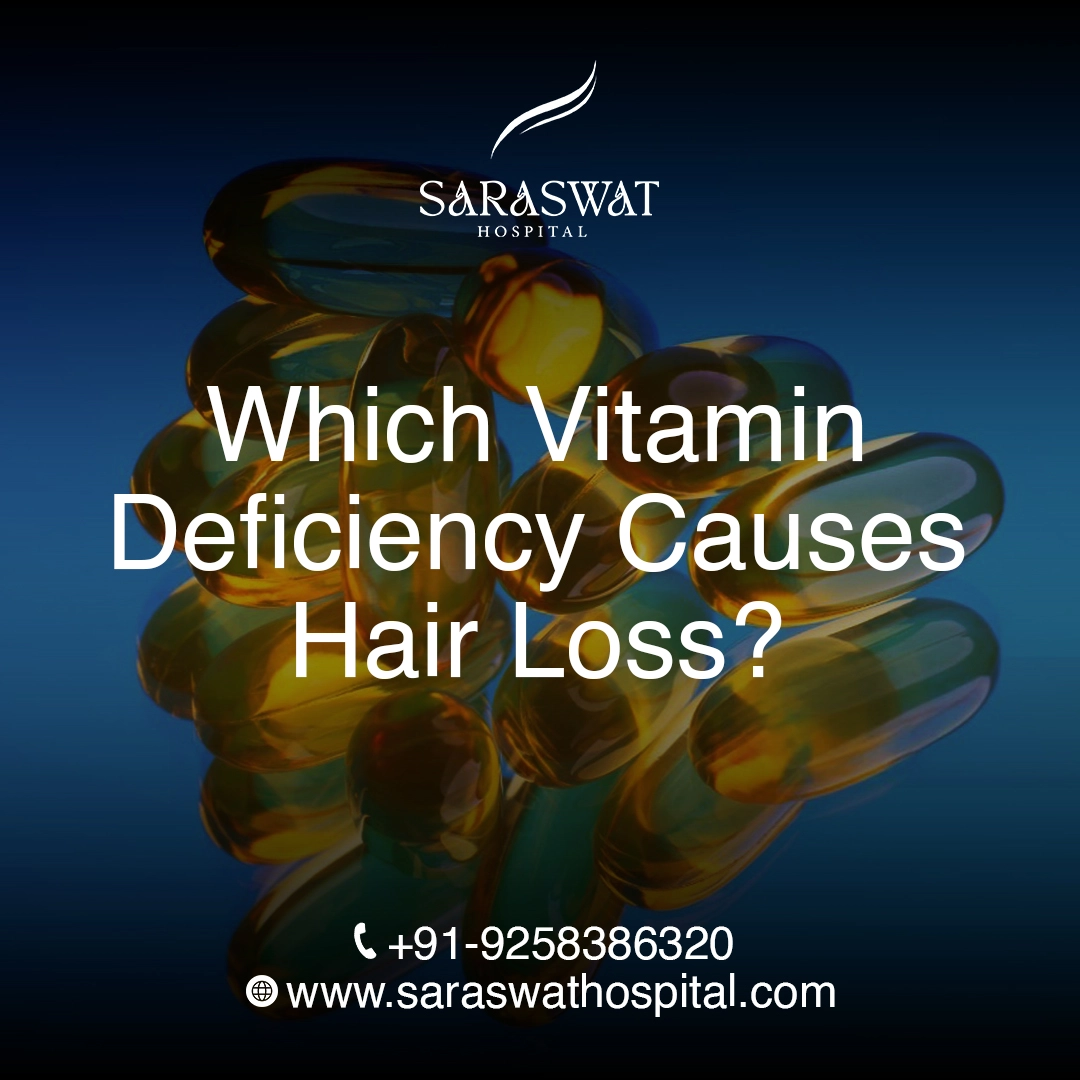Facing severe hair fall issues? Your regular vitamin intake might be responsible for that. You should maintain a proper lifestyle and diet for healthy hair growth. To know more, read the article till the end to know Which Vitamin Deficiency Causes Hair Loss and what will be the best option for you to reverse the hair loss problem.
Understanding Vitamin Deficiency and Hair Loss
Vitamin D has a major role in maintaining healthy hair and skin. The impact of vitamin deficiency is visible through hair breakage, slow hair growth, and brittle hair. But now the question is, which other vitamin deficiencies cause hair loss? Some vitamins provide nutrients that the hair follicles need for growth. The vitamins help in protein synthesis, which helps in producing strands for healthy hair growth.
For example, antioxidants help to protect the hair from oxidative stress, while vitamin B helps in metabolism and hair growth. So, you need to rely on a healthy diet to keep your hair healthy and strong.
Know Which Vitamin Deficiency Causes Hair Loss?
Find which vitamin deficiency causes hair loss, including deficiencies in Vitamin D, Iron, Zinc, and Vitamin B12. Learn the role of vitamins and minerals in hair loss and how to maintain balance through diet or supplements to prevent thinning. Read more for expert insights! Hair receives nutrients from food to keep it healthy and strong. Let us know which vitamins are important for hair growth:
Vitamin D
A deficiency of vitamin D leads to hair breakage and hair loss. Sometimes, vitamin D deficiency is also responsible for premature graying. In that case, you may need a simple blood test to assess the level of vitamin D. A person generally requires a dosage of 2000-4000 IU per day. Discuss daily intake with the doctor to avoid interaction with other medications.
Vitamin A
Apart from vitamin D, vitamin A deficiency also causes noticeable hair thinning or shedding. Sometimes, the hair regrowth phase takes more time than normal. Generally, vitamin A deficiency shows symptoms like dandruff flaking, which could be the main reason for hair loss.
Vitamin E
Lack of vitamin E leads to dry, damaged hair with split ends, which makes the hair fall out. Doctors generally recommend blood tests to diagnose the level of vitamin E. Apart from hair loss, low levels of vitamin E create other autoimmune disorders like psoriasis or alopecia areata. A replenished vitamin E level recovers the thin and damaged hair.
Vitamin B12
A deficiency of vitamin B12 affects red blood cells and also disrupts the oxygen delivery in hair follicles, resulting in severe hair loss. Not only hair fall, but people with B12 levels may experience hair thinning. Low B12 levels are common in people who are vegan and avoid animal-based products. Incorporating Vitamin B12 in your diet can minimize the risk of hair thinning.
Biotin
Biotin is another water-soluble vitamin that plays a significant role in maintaining healthy hair. A low biotin level makes hair brittle enough that it can easily fall out. Biotin helps in the formation of keratin, which makes the hair strand out. You can include biotin-rich foods (eggs, legumes, nuts) in your diet to maintain healthy hair that has strong roots.

What Are Other Causes of Hair Fall
Now you know Which Vitamin Deficiency Causes Hair Loss. Vitamin D deficiency is the most common culprit of hair loss. But it is not the only one; there could be other reasons that are responsible for hair loss, such as:
● Genetic: You are likely to develop hair loss problems if any of your family members have the same history. Excessive DHT hormone makes the hair follicle shrink, leading to thin hair or hair loss.
● Stress: When you are under stress, your body will release the cortisol hormone that disrupts hair growth. Stress could be another red flag that causes hair to fall.
● Your Medical condition: Apart from the other reasons, you are likely to develop hair loss issues if you suffer from thyroid disorders or autoimmune diseases such as alopecia areata. Anemia, too, should be checked for!
● Hairstyling and Grooming: You should avoid hairstyles such as ponytails, braids, and buns to maintain your hair’s health. These hairstyles put excessive tension on hair follicles, so they easily get uprooted.
These are all the other causes of hair loss. Hopefully, these will help you to take the necessary steps to prevent hair loss. If you are suffering from a severe hair-fall issue or hair shedding, then you can go for a hair transplant. Let’s know more about this:
When Hair Transplants Become the Ideal Solution for Hair Loss
Sometimes, the supplements or any other attempts may not be enough for hair regrowth or to prevent hair fall issues. In that case, a hair transplant is the best option to consider. There are a lot of hair transplant clinics in India that offer these hair restoration treatments.
These clinics generally offer modern treatments for hair fall, such as Follicular Unit Excision (FUE) and Follicular Unit Transplantation (FUT). These processes are easy to go with, and they provide more natural-looking results.
But make sure you hand over the treatment to a surgeon who is experienced and has good reviews in this treatment process.
Hair Transplant Treatment Option
You can follow several hair loss treatments. Depending upon your condition, your doctor can choose the best available option for you. These options are :
- Laser hair regrowth therapy
- Transplantation.
How To Choose The Best Doctor For Hair Transplant
The hair transplant process is a bit difficult and costly, so choose an expert for the same treatment. Read more to choose the best doctor for a hair transplant :
- Qualification: Check whether the doctor holds good credentials to perform a hair transplant procedure. He/She should be an ABHRS-certified surgeon, a member of ISHRS, AHRS, and so on.
- Experience: Another important factor in choosing the best doctor is to check their experience. In that case, you can ask him about the number of years of experience in the field and look for various testimonials.
- Skill of the Surgeon: The hair transplant process involves 60% artistic skill and the rest through a scientific approach.
Key Takeaway
Hope the article has given you an idea about the vitamins that cause hair loss. Vitamins A, B, B12, and biotin are all important to maintaining healthy hair growth. If these supplements do not fetch you a better result, then consider opting for a hair transplant. Seek out the surgeon from Saraswat Hospital to ensure that your hair gets the tender care and nourishment.
FAQs
1. Does vitamin D deficiency cause hair fall?
Yes, a low level of vitamin D is linked with hair loss. People with alopecia areata should include this in their regular diet.
2. What are some foods that prevent hair loss?
To prevent hair loss, you should eat foods that are rich in antioxidants, vitamin D, vitamin B-12, biotin, and vitamin E. The sources of these foods are eggs, green vegetables, etc.
3. Can vitamins help recover from the hair loss situation?
There are many reasons behind hair loss, and a lack of vitamins is one of them. If you don’t have genetic issues, then taking vitamin supplements can reverse the situation.
4. How do I know if I am the right fit for a hair transplant?
If vitamin supplements don’t work for you, then you can contact the doctor for further assistance. In that case, you might need further check-ups.
5. Mention the best treatment available for hair loss.
Increase the intake of your regular vitamin supplements along with other medications.


